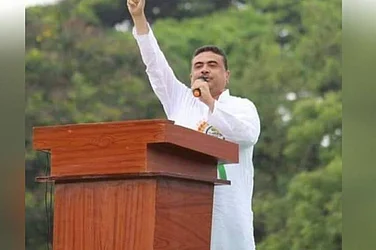Six months after they had to abandon their courses and return home when Russian forces attacked Ukraine, Indian students enrolled in the medical colleges there have a new challenge - resumption of offline classes and exams.
Some universities in Kiev, capital of war-hit Ukraine, have informed students about resumption of offline classes from September and mandatory examination "Krok" to be conducted in October in offline mode.
According to norms in Ukraine, in third year of their studies, students from medicine, dentistry, and pharmacy have to appear for KROK-1. After completion if final year, the students have to sit for the state's licensing exam, KROK-2, for certification to be a doctor or pharmacist.
Staring at an uncertain future while attending classes online since six months, 20-year-old Ashna Pandit, a student of Taras Shevchenko National Medical University in Kyiv, was shocked to receive a message from her university.
"We are ready to hold offline classes...starting from September 1. Your safety is guaranteed," the message read. Noida residents Ashna and her twin brother Ansh, who are fourth year medical students, are now in panic about what to do next.
"The idea of returning to Ukraine when the war is still on is very scary. I spoke to the university authorities, they said that the situation is normal in Kieve but till when? The university still hasn't clarified that if they will be offering online classes for those who cannot make it to the campus.
"Even if they agree to online classes for some of us, the medical council in India does not recognise the online courses in medicine. It is a nightmare. Earlier, the university was telling us that they are arranging some mobility programme for us in Poland or in Georgia but that hasn't materialised," she told PTI.
Ashna said even if students do not return to Ukraine for classes they will have to go anyway for Krok as its a qualifying exam to be promoted to fourth year. A student of Bogomolets National Medical University in Kiev has similar concerns.
"The university is asking us to return to campus. I am not sure what to do. I am in my final year and have just few months remaining for completion of my course. Part of me wants to take the risk and just be done with it while part of me isn't sure if it will be safe to be there in coming time," said the Gurgaon resident, refusing to be identified.
According to sources, around 20,000 medical students from India were evacuated in March after the war escalated. The students have been staging protests demanding admission in Indian medical colleges as a one-time measure.
The Centre had told Lok Sabha last month that there are no such provisions in the Indian Medical Council Act 1956 and the National Medical Commission Act, 2019 as well as the regulations to accommodate or transfer medical students from any foreign medical institutes to medical colleges in India. Gavesh Sharma, a 23-year-old who hails from Churu in Rajasthan, said his family is not willing to let him take the risk.
"The university is calling us. Some students are already planning their trip too and finding alternate routes to go but my family is not willing to let me take the risk. So I will wait to see how situation unfolds. I have to write Krok exam too but I will take it next year if I cannot appear this year. An year will be lost but at least life will be safe," he said.
Sharma, also studies at Taras Shevchenko National University. He said the university has already sent an intimation for fee payment for next semester.
The Supreme Court had on April 29 directed the regulatory body to frame a scheme in two months to enable MBBS students affected by the war and the pandemic to complete their clinical training in medical colleges India.
Through a circular issued in March, the NMC had allowed returning foreign medical to complete their remaining part of internship in India subject to the condition that they must have cleared FMGE (Screening Test), which is mandatory for Indian students with foreign medical qualification to practice medicine in India.
This relief was for students who could not complete their internship due to situations beyond their control such as war, Covid etc. In March, a public interest litigation was filed in the Supreme Court seeking directions on the issue of admission and continuation of their studies in India.
The plea also sought directions from the Centre to provide a medical subject equivalency orientation programme for such students. The Indian Medical Association (IMA) had also recommended to Prime Minister Narendra Modi that such students be accommodated in Indian medical colleges as a one-time measure.
In a letter to Modi on March 4, the IMA had said such students should be permitted to go to Indian medical colleges for the remainder of their MBBS courses through an "appropriate disbursed distribution", but it should not be seen as an increase in the annual intake capacity.
(With PTI inputs)









.png?auto=format%2Ccompress&fit=max&format=webp&w=768&dpr=1.0)



.png?auto=format%2Ccompress&fit=max&format=webp&w=376&dpr=2.0)




.png?w=200&auto=format%2Ccompress&fit=max)







